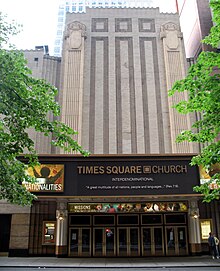Michał Hydzik
He was an anti-ecumenist, uninterested in closer cooperation with related Evangelical groups, but he aspired to unite all Pentecostal movements.
[2] In 1946, his father, who was a preacher in the Christian Faith Evangelical Church [pl], was killed along with other members of the congregation.
He began studies at the Christian Theological Academy in Warsaw but had to interrupt them to take care of his sick mother.
[2] During the 1960s, he faced repression from the communist authorities[3] and was suspected by the Security Service of collaborating with the Workers' Defence Committee after 1976.
[5] From 1966 to 1976, as a member of the United Evangelical Church in Wapienica near Bielsko-Biała, Hydzik served as an evangelist and district youth leader.
He introduced monthly healing services, and under his leadership, the congregation grew from 35 to over 200 members in ten years.
Each summer, he organized youth courses in Głębce [pl], Koszalin, and Przemyśl, adhering to an unwritten rule that no one could leave without receiving the baptism with the Holy Spirit.
[8] He conducted talks with representatives of the Christian Pentecostal Fellowship, encouraging them to join the United Evangelical Church.
[11] Hydzik's leadership was not accepted by a group of congregations from Lublin, which was one of the reasons for the formation of the Christian Faith Evangelical Church [pl].
[15] As chief presbyter, he desired to integrate the entire Pentecostal movement in Poland and initially had a lot of enthusiasm for this goal.
However, during the discussions, representatives of other groups limited themselves to criticizing these initiatives, accusing the Pentecostal Church of trying to absorb them and not presenting their own proposals.
[14] According to Mieczysław Czajko [pl], Hydzik contributed significantly to the numerical growth of Polish Pentecostalism.
[7] In his autobiography, he wrote that he fondly remembered annual evangelistic events in Wrocław, Nysa, Opole, Zielona Góra, Nowa Sól, Gliwice, Bydgoszcz, Hajnówka, Łódź, and Przemyśl.
[24] Hydzik was perceived as an anti-ecumenist who significantly contributed to the dissolution of the United Evangelical Church.
In 1983, he wrote an article on the subject in Chrześcijanin [pl] magazine (The Exorcism of Demons), and in 2004, he published an entire book titled Enemies.
[28] On 16 February 2013, a conference titled Ministry of Deliverance was organized to establish the church's position on demonology.
[32] When the issue of "intercessors" arose in the late 1990s, he was unable to take a definitive stance, which was criticized by his successor, Mieczysław Czajko [pl].
[33] Hydzik responded that he was emotionally connected to the individuals in the "intercessor" movement, initially saw them as the future of the church, and therefore left the resolution of this issue to his successor.
(1994), he expressed the controversial view that the generation of 1948[c] would not die a natural death (i.e., people born in that year would witness the end of the world).

